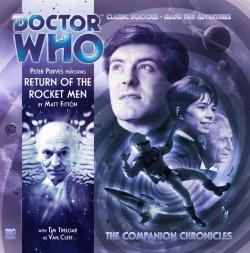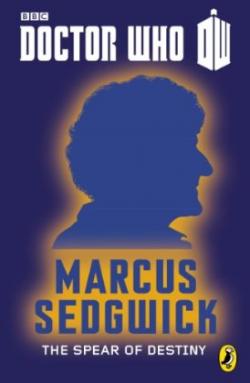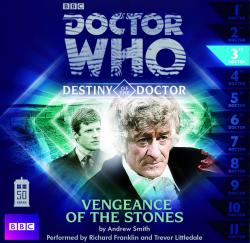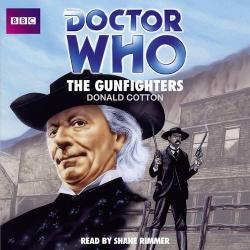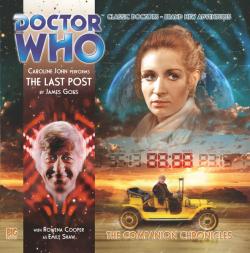The Bells of Saint John

Doctor Who - The Bells of Saint John
Written by Steven Moffat
Directed by Colm McCarthy
Broadcast on BBC One - 30 March 2013
‘A new series and a new companion,’ announced BBC One shortly before its stream of consciousness was interrupted by something outside the accepted norms of out-of-vision continuity. Doctor Who has on and off promoted itself as an interruption, an Adventure in Space and Time outside a schedule it implicitly paints as mundane and workaday. Forty-odd years ago, when it was ‘the children’s own programme which adults adore’, tucked away early on a Saturday evening amidst sport, light entertainment and imported series or TV movies, it was perhaps easier to indulge Doctor’s adventures. In the Doctor’s fiftieth year, television programmes compete in a much wider field and Doctor Who has to interrupt the evening of a much wider cross-section of the audience than its ancient niche to justify its continued appearance on our screens. Happily The Bells of Saint John did so with the sort of precision engineering which qualified the Doctor’s bike for the anti-grav Olympics, and which will hopefully have a similar effect in the television ratings.
The Bells of Saint John worked hard. While there was much for the seasoned viewer to recognise and enjoy because their foreknowledge was anticipated, the episode functioned more than perfectly well as an embarkation point for new viewers. Travel in time and space was presented in a series of short settings ranging from the domestic to different blends of action-adventure, with more than a twist of the surreal. The ordinary was turned inside out to become unsettling and events and characters depicted with a lightness which was deceptive. The paranoia of the individual in a connected world was ruthlessly exploited. It’s never been fashionable to embrace the Doctor as fundamentally an Everyman, as Christopher H Bidmead once argued he was, but the Doctor’s experience in the rooftop café by St Paul’s must have disturbed everyone who even for a few seconds has imagined that a roomful of strangers is talking to them. Like much of the best Doctor Who of recent years, such as Blink or Midnight, it develops a threat from memories of the nastier examples of childhood interaction. Even the broad strokes with which the villainy of Miss Kizlet is defined ultimately suggest a childhood interaction which went badly wrong, though this is an area in which her client has previous and (within the ongoing narrative of the programme) recent experience.
Each time Doctor Who has returned to television, the worldwide promotion of the series launch has increased. More than any episode since the 2005 series, The Bells of Saint John seemed self-consciously to advertise Doctor Who’s status as a standard bearer for a particular export variety of Britain. As in Rose eight years ago, London was presented as a series of familiar landmarks juxtaposed with a threat associated with a new addition to the skyline, in this case the Shard. Repetition worked, not just because Doctor Who’s worldwide audience has expanded since 2005, but because it reassures those familiar with the use of major new London buildings as headquarters of sinister forces in the series (a history stretching back to 1966 and The War Machines) while at the same time amplifying their anticipation of developments within the story. The programme’s identity is confirmed to those who know it. London is presented to newcomers as somewhere continually remade: exotic, dangerous, but ultimately made safe for time and space travellers, and inhabited by friendly (if occasionally possessed) folk liable to interpret the arrival of a time and space machine as a remarkable piece of busking.
In contrast, northern England (and by extension all parts of the United Kingdom which are not London) is remote and best experienced as a representation of the past, though the all-male monastic retreat where anachronistic ideas like telephones and communicative women are greeted with alarm is a dysfunctional extreme. For the Doctor, withdrawal into such a place is of limited use. His choice and his natural abode is the new. Both he and Clara are voices on the other end of a phone helpline: Clara has called for help but the Doctor is also seeking answers from her. Both collapse time zones as much as BBC Worldwide’s sales force seek to do with increasing success. For the first time a BBC One broadcast of a new Doctor Who episode ended with the BBC Worldwide animation familiar from DVD releases, confirming the placing of the programme as global BBC brand suggested by the narrative’s flirtation with tourist-video quirkiness.
The use of imagery is not alone in recalling Rose. Some of Clara’s exchanges with the Doctor echoed Rose’s initial questions word-for-word, though she has been more successful than Rose at putting an opinionated parent at a distance. There are several retroactive references which are rendered unobtrusive by having other functions in the plot, but which court speculation. Is it accidental that Clara has a book written by Amy? Recent precedent suggests not. Who was the woman in the shop who gave Clara the Doctor’s number? Given the casting announcement for the fiftieth anniversary episode made (by accident) earlier in the day, the comparisons possible between Miss Kizlet in The Bells of Saint John and Miss Foster in Partners in Crime must have led several fan viewers to expect another parallel between the two.
The Clara of The Bells of Saint John is a less preternaturally self-possessed character than either Oswin in Asylum of the Daleks or Clara in The Snowmen. Given that this Clara doesn’t have any computer expertise until she is uploaded to and then downloaded from the Cloud, it’s possible that this is the first Clara, from which the others are in some way spun off; this may be grasping at a straw. Her dialogue may echo Rose but her rapid-fire delivery and some turns of phrase recall the early David Tennant Doctor (‘That’s weird’): but this is another straw, over which half-formed red herrings leap in the fan mind.
The Bells of Saint John furthers the mission statement of series seven to provide a cinematic experience. Several scenes seemed made with HD and a large screen in mind, from the defiantly comedic but enthralling motorbike ride up the Shard, to the detail in the maps, the threading of this particular web of fear across the computer-simulated globe, and the patterns of light which danced and fluttered within the Spoonheads. Cinematic Doctor Who is less afraid of contrast on screen and where a few years ago townscapes were narrowly shot and underlit, the London of The Bells of Saint John rejoices both in the pinhead lights shining from the distant city at night, and the sunshine of early morning. It’s still a series which won’t linger on most effects shots. Doctor Who was never about effects shots, but in an entertainment world where CG is regarded by many as a performer in its own right it is probably the done thing to look bothered about them for a fraction of a second at a time before the episode is furiously driven onwards.
Matt Smith remains in great command of the Doctor, and increasingly so, his physicality seeming less intrusive this year than previously. The Doctor’s enjoyment of his anonymity, overstressed in the first segment of this season, seems to be reined in here, perhaps because of the less exuberant Doctor seen since the loss of the Ponds but also because the point for long-term viewers has been made. As a character, the Doctor is still too complacent about the question ‘Doctor Who?’ UNIT will not have forgotten, and the Great Intelligence certainly has not. If the Doctor is again the principal viewpoint character of Doctor Who, then the programme’s apparently implausible insistence on the effectiveness of the erasure of the Doctor from history might be an expression of the Doctor’s own insouciance. This situation will not last for ever.
The confusion of computer skills with knowledge of internet culture, and of the information transmitted through wi-fi with the technology itself, will have annoyed many fans of a technical bent, and were Sydney Newman here he would probably agree. The idea that human identity and personality can be rendered as easily digitised signals will raise eyebrows among psychologists, physiologists and philosophers to name but three, but it recognises that in the age of Facebook and Twitter more people are representing themselves more frequently and more widely as abbreviated biographical data than was ever possible before. The images of human faces on screens, asking for help, no longer sure of their location, were major narrative devices in The Idiot’s Lantern seven years ago, but they seem more effective in the age of Skype and personal mobile webcams than in the days of Alexandra Palace and 405-line broadcasting. The Bells of Saint John might appear as frothy as the top of Clara’s breakfast smoothie, but it’s a deft blend of bright colours and pan-generational anxieties which proved a seductively sinister reintroduction to Doctor Who.
